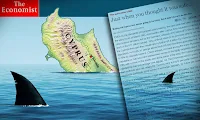Economic slump in Russia poses an increasingly serious threat to the German companies operating in that country, the President of the Association of German Chambers of Commerce and Industry (DIHK), Dr. Volker Treier said in an interview published by Bild am Sonntag newspaper.
The crisis in the Russian economy is putting an increasingly bigger brake on the business operations of German companies in Russia, Dr. Treier said, adding their activities were suffering in the first place from the falling exchange rate of the ruble.
A poll taken among the 300 or German companies in Russia showed that one company in three would have to cut their staffs if the situation did not improve shortly.
Executives of as many as 36% companies believed they would have to cancel the previously planned projects, Dr. Treier said.
In addition, he indicated that 10% companies reported their time-tested Russian partners were reorienting to the Asiatic markets.
To round out the rather discouraging picture, one company in eight was pondering withdrawal of its business from Russia, Dr. Treier said. [itar-tass.com]
21/12/14
--
-
The crisis in the Russian economy is putting an increasingly bigger brake on the business operations of German companies in Russia, Dr. Treier said, adding their activities were suffering in the first place from the falling exchange rate of the ruble.
A poll taken among the 300 or German companies in Russia showed that one company in three would have to cut their staffs if the situation did not improve shortly.
Executives of as many as 36% companies believed they would have to cancel the previously planned projects, Dr. Treier said.
In addition, he indicated that 10% companies reported their time-tested Russian partners were reorienting to the Asiatic markets.
To round out the rather discouraging picture, one company in eight was pondering withdrawal of its business from Russia, Dr. Treier said. [itar-tass.com]
21/12/14
--
-
















 GR
GR FR
FR DE
DE ES
ES IT
IT RU
RU EU
EU